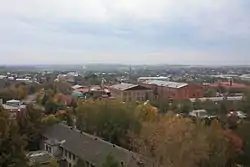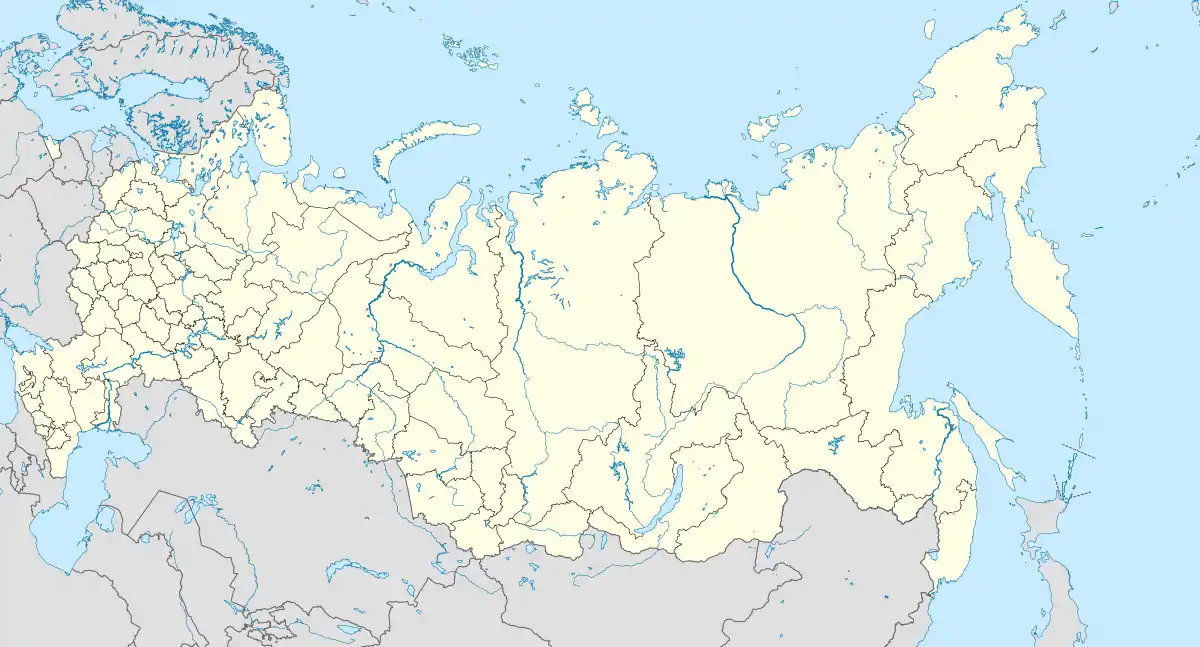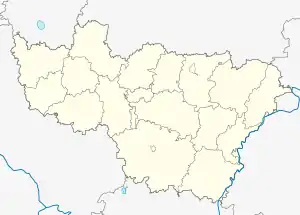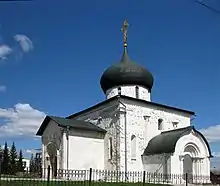Yuryev-Polsky (town)
Yuryev-Polsky (Russian: Ю́рьев-По́льский) is an old town and the administrative center of Yuryev-Polsky District of Vladimir Oblast, Russia, located in the upper reaches of the Koloksha River, 68 kilometers (42 mi) northwest of Vladimir, the administrative center of the oblast. Population: 19,595 (2010 Census);[2] 19,906 (2002 Census);[8] 22,247 (1989 Census);[9] 23,000 (1974).
Yuryev-Polsky
Юрьев-Польский | |
|---|---|
Town[1] | |
 View of Yuryev-Polsky | |
 Flag _(1781).png.webp) Coat of arms | |
Location of Yuryev-Polsky 
| |
 Yuryev-Polsky Location of Yuryev-Polsky  Yuryev-Polsky Yuryev-Polsky (Vladimir Oblast) | |
| Coordinates: 56°30′N 39°41′E | |
| Country | Russia |
| Federal subject | Vladimir Oblast[1] |
| Administrative district | Yuryev-Polsky District[1] |
| Founded | 1152 |
| Elevation | 140 m (460 ft) |
| Population | |
| • Total | 19,595 |
| • Estimate (2018)[3] | 18,433 (−5.9%) |
| • Capital of | Yuryev-Polsky District[4] |
| • Municipal district | Yuryev-Polsky Municipal District[5] |
| • Urban settlement | Yuryev-Polsky Urban Settlement[5] |
| • Capital of | Yuryev-Polsky Municipal District[5], Yuryev-Polsky Urban Settlement[5] |
| Time zone | UTC+3 (MSK |
| Postal code(s)[7] | 601800 |
| Dialing code(s) | +7 49246 |
| OKTMO ID | 17656101001 |
History
It was founded by Yury Dolgoruky in 1152. First part of its name derives from Yury's patron saint, St. George. The second part is derived from the word polsky meaning "in the fields". This specification was needed in order to distinguish the town from the earlier established fortress of Yuryev (nowadays Tartu), at the time located in the woods in what is now Estonia and then the biggest Russian settlement in the territory of the Chuds.
Upon Vsevolod III's death in 1212, the town was assigned to one of his youngest sons, Svyatoslav. It was that prince who personally designed the town's chief landmark, the Cathedral of St. George (1230–1234). It is the latest pre-Mongol construction in Russia, unprecedented in abundance of stone sculptures, and also the model for first stone churches in the Moscow Kremlin. In the 1460s, the cathedral's dome collapsed, thus burying most of unique sculptures which had adorned the cathedral walls. The collapsed roof was sloppily restored by a well-known Muscovite artisan, Vasili Yermolin, in 1471.

The great Battle of Lipitsa was fought near the town in 1216. In 1238, Yuryev was sacked by the Mongols. A century later, it was incorporated into the Grand Duchy of Moscow. The chief monument of the Muscovite period is the walled Monastery of Archangel Michael, founded in the 13th century and containing various buildings from the 17th and 18th centuries. Several miles from Yuryev, on the bank of the Yakhroma River, stands the Kosmin Cloister, whose structures are typical for the mid-17th century.
Administrative and municipal status
Within the framework of administrative divisions, Yuryev-Polsky serves as the administrative center of Yuryev-Polsky District,[4] to which it is directly subordinated.[1] As a municipal division, the town of Yuryev-Polsky is incorporated within Yuryev-Polsky Municipal District as Yuryev-Polsky Urban Settlement.[5]
References
Notes
- Resolution #433
- Russian Federal State Statistics Service (2011). "Всероссийская перепись населения 2010 года. Том 1" [2010 All-Russian Population Census, vol. 1]. Всероссийская перепись населения 2010 года [2010 All-Russia Population Census] (in Russian). Federal State Statistics Service.
- "26. Численность постоянного населения Российской Федерации по муниципальным образованиям на 1 января 2018 года". Federal State Statistics Service. Retrieved January 23, 2019.
- Государственный комитет Российской Федерации по статистике. Комитет Российской Федерации по стандартизации, метрологии и сертификации. №ОК 019-95 1 января 1997 г. «Общероссийский классификатор объектов административно-территориального деления. Код 17 256», в ред. изменения №278/2015 от 1 января 2016 г.. (State Statistics Committee of the Russian Federation. Committee of the Russian Federation on Standardization, Metrology, and Certification. #OK 019-95 January 1, 1997 Russian Classification of Objects of Administrative Division (OKATO). Code 17 256, as amended by the Amendment #278/2015 of January 1, 2016. ).
- Law #55-OZ
- "Об исчислении времени". Официальный интернет-портал правовой информации (in Russian). June 3, 2011. Retrieved January 19, 2019.
- Почта России. Информационно-вычислительный центр ОАСУ РПО. (Russian Post). Поиск объектов почтовой связи (Postal Objects Search) (in Russian)
- Russian Federal State Statistics Service (May 21, 2004). "Численность населения России, субъектов Российской Федерации в составе федеральных округов, районов, городских поселений, сельских населённых пунктов – районных центров и сельских населённых пунктов с населением 3 тысячи и более человек" [Population of Russia, Its Federal Districts, Federal Subjects, Districts, Urban Localities, Rural Localities—Administrative Centers, and Rural Localities with Population of Over 3,000] (XLS). Всероссийская перепись населения 2002 года [All-Russia Population Census of 2002] (in Russian).
- "Всесоюзная перепись населения 1989 г. Численность наличного населения союзных и автономных республик, автономных областей и округов, краёв, областей, районов, городских поселений и сёл-райцентров" [All Union Population Census of 1989: Present Population of Union and Autonomous Republics, Autonomous Oblasts and Okrugs, Krais, Oblasts, Districts, Urban Settlements, and Villages Serving as District Administrative Centers]. Всесоюзная перепись населения 1989 года [All-Union Population Census of 1989] (in Russian). Институт демографии Национального исследовательского университета: Высшая школа экономики [Institute of Demography at the National Research University: Higher School of Economics]. 1989 – via Demoscope Weekly.
Sources
- Администрация Владимирской области. Постановление №433 от 13 июня 2007 г. «О реестре административно-территориальных образований и единиц Владимирской области», в ред. Постановления №169 от 5 марта 2015 г. «О внесении изменения в Постановление Губернатора области от 13.06.2007 №433 "О реестре административно-территориальных образований и единиц Владимирской области"». Вступил в силу со дня официального опубликования. Опубликован: "Владимирские ведомости", №114, 20 июня 2007 г. (Administration of Vladimir Oblast. Resolution #433 of June 13, 2007 On the Registry of the Administrative-Territorial Formations and Units of Vladimir Oblast, as amended by the Resolution #169 of March 5, 2015 On Amending Resolution #433 of the Oblast Governor of June 13, 2007 "On the Registry of the Administrative-Territorial Formations and Units of Vladimir Oblast". Effective as of the day of the official publication.).
- Законодательное Собрание Владимирской области. Закон №55-ОЗ от 11 мая 2005 г. «О наделении Юрьев-Польского района и вновь образованных муниципальных образований, входящих в его состав, соответствующим статусом муниципальных образований и установлении их границ», в ред. Закона №54-ОЗ от 14 июня 2012 г. «О внесении изменений в Приложение 8-1 к Закону Владимирской области "О наделении Юрьев-Польского района и вновь образованных муниципальных образований, входящих в его состав, соответствующим статусом муниципальных образований и установлении их границ"». Вступил в силу со дня официального опубликования (17 мая 2005 г.). Опубликован: "Владимирские ведомости", №156–157, 17 мая 2005 г. (Legislative Assembly of Vladimir Oblast. Law #55-OZ of May 11, 2005 On Granting Yuryev-Polsky District and the Newly Established Municipal Formations It Comprises an Appropriate Status of the Municipal Formations and on Establishing Their Borders, as amended by the Law #54-OZ of June 14, 2012 On Amending Appendix 8-1 to the Law of Vladimir Oblast "On Granting Yuryev-Polsky District and the Newly Established Municipal Formations It Comprises an Appropriate Status of the Municipal Formations and on Establishing Their Borders". Effective as of the day of the official publication (May 17, 2005).).
External links
| Wikivoyage has a travel guide for Yuryev-Polsky. |